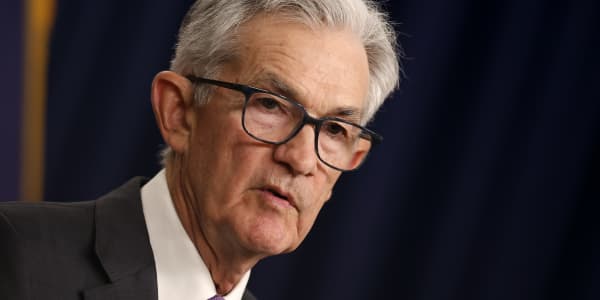This report is from today's CNBC Daily Open, our new, international markets newsletter. CNBC Daily Open brings investors up to speed on everything they need to know, no matter where they are. Like what you see? You can subscribe here.
What you need to know today
Apple's revenue falls from a year ago
Apple beat Wall Street expectations for both earnings and sales in its fiscal third quarter, buoyed by accelerating growth in services. However, overall sales fell 1% year over year to $81.8 billion, with iPhone, iPad and Mac revenue all dropping. The company's CFO indicated revenue for the September quarter might drop 1% as well. Shares dipped 2% in extended trading.
Blowout profits for Amazon
Amazon shares surged 8.7% in extended trading after it reported earnings and gave a third-quarter forecast higher than expectations. Second-quarter revenue rose nearly 11% from a year earlier to $134.4 billion and net income was $6.7 billion — beating the earnings per share estimate by almost two times — compared with a loss of $2 billion a year earlier. CEO Andy Jassy's cost cutting certainly worked.
Markets under pressure
U.S. stocks fell for a second straight day as Treasury yields popped, with the 10-year Treasury yield trading around 4.18%, its highest since November 2022. Asia-Pacific markets creeped higher Friday as investors digest Big Tech earnings. Hong Kong's Hang Seng Index added 1%, leading gains in the region, in a rally propelled by property and basic materials stocks. Meanwhile, Australia's S&P/ASX 200 lost 0.2% as the country's central bank cut its growth outlook to 1% this year.
Defense stocks on the offense
South Korean defense stocks have shot up over the past 12 months, with Hanhwa Aerospace surging 66% year to date. Interest in South Korean arms has increased because of Russia's invasion of Ukraine and escalating tensions on the Korean Peninsula. South Korea exported 22.9 trillion won ($17.9 billion) worth of equipment in 2022, more than double the previous year, Morgan Stanley noted.
[PRO] India's 'stark contrast' to China
Companies are setting up new factories in India to diversify their supply chains from China. At the same time, China's economy is still sluggish. That's caused Morgan Stanley to call the economic situation in India a "stark contrast to that in China." The bank also recommended four Indian stocks to ride the coming Indian wave.
The bottom line
Investors are punishing companies that show any sign of weakness this earnings season.
Qualcomm sank around 8.2% after its adjusted revenue missed expectations. Expedia plunged 16.4% on its revenue and bookings miss. PayPal beat forecasts for both adjusted earnings and revenue, but still slumped 12.3% because of concerns over weaker-than-expected margins and a drop in active accounts.
Even mega-cap Apple, which beat both top- and bottom-line expectations — but reported weakness in its hardware segments — wasn't spared in extended trading.
Those drastic drops weighed down major indexes. The S&P 500 fell 0.25%, the Dow Jones Industrial Average slid 0.19% and the Nasdaq Composite retreated 0.1%. It's the second day of losses for those indexes, suggesting investors are starting to reassess whether the recent rally's sustainable.
Indeed, Wall Street's "fear gauge" hit its highest level since July. The Cboe Volatility Index, which measures the market's expectations for price swings in the S&P, rose to 17.42. But on an absolute basis, that's still low — the VIX was above 30 in March when regional banks were failing.
Perhaps investors are just looking more closely at fundamentals, that is, at whether stock prices can be justified by the company's earnings. Analysts have pointed out that the S&P has been expensive, meaning that prices are high relative to earnings. And that high price-to-earnings ratio is behind the surge in markets over the past few months.
A drop in stocks, then, may not necessarily be that bad for more sustained momentum in the long run.





